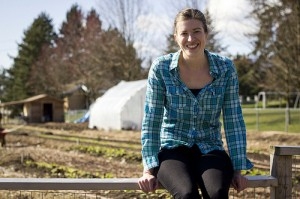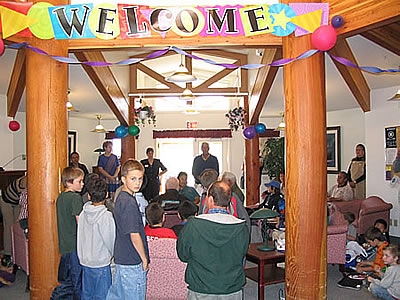You might say Heather Johnstone is your typical Vancouver North Shore anthropologist-turned-farmer-turned-social-entrepreneur. Only she doesn’t quite see herself that way. “I’m a farmer,” laughs Johnstone, who’s been managing the North Shore Neighourhood Houses’s Edible Garden Project for the last three years, “not a business person.”
And then she proceeds to casually mention her goal to have her project’s social enterprise, the Loutet Farm, “sustainably self-sustaining within five years,” tossing in words like “break-even” and “profit margin” in the same breath. Despite her protestation, it turns out Johnstone’s got some social venture chops after all.
Those chops should serve her well as she, along with two other talented social entrepreneurs, pitch their three mission-based businesses competitively as selected finalists in Enterprising Non Profit’s Fifth Annual “Social Enterprise Heroes,” to be held the evening of March 27 at Vancouver’s Roundhouse Community Arts Centre.
Social enterprise central
One part cocktail reception, a splash of tongue-in-cheek reality show, and a healthy dose of serious professional development, Social Enterprise Heroes is the signature event capping a full day of activities dedicated to social enterprise and social entrepreneurship in BC, including a Day of Learning and a tradeshow.
Other finalists in this year’s pitch, which is open to the public, are Tradeworks Training Society and Ktunaxa/Kinbasket Child and Family Services.
Building on past experience
Tradeworks, located in Vancouver’s downtown east side, has the distinction of being the only nonprofit to have been invited back to pitch a second time at Social Enterprise Heroes. As participants in 2009’s inaugural competition, they put forward their Tradeworks Custom Products program, which provides women in challenging circumstances with entry-level employment, carpentry skills and confidence, to launch them into careers in trades.Flash forward to January 2, 2013. Maninder Dhaliwal, Tradeworks’ executive director, had been in her new job for less than one day when she decided to enter Tradeworks’ other social enterprise, the Rona FabShop, into the Social Enterprise Heroes competition. “I saw we needed help streamlining the organization’s message, sharing who we are and what we do in a consistent manner,” she explained.
The FabShop is a social enterprise and training program aimed at helping at-risk young adults learn basic woodworking and job skills and find their way into the workforce. Dhaliwal, who also serves as the FabShop’s interim manager, sees the March 27 event and, even more significantly, the mentoring that is provided to each of the finalists, as “a great opportunity to meet the whole social enterprise community.”
A winning model of service delivery
As that community continues to expand throughout the province, it’s apt that this year’s finalists once again include an organization from outside BC’s Lower Mainland. Eva Coles will present the newest social enterprise of the group, a training and consulting service launched in April 2012, whose revenues support Ktunaxa/Kinbasket Child and Family Services, based in the Kootenay region of southeastern British Columbia.
Ktunaxa/Kinbasket Child and Family Services open houseThe agency, where Coles has worked as Manager of Innovation and Prevention Services for the past 13 years, has developed an award-winning model for delivering services to keep families intact, designed to allow Aboriginal children to know their families of origin, and to prevent more children from entering the foster care and adoption streams.
The new business was sparked by Coles’ desire to respond to the growing demand for workshops and speaking engagements about the new model, which until last year they were providing for free. She and her team decided to test the waters to see if there was a market willing to pay for these services. They started charging fees, and with only word-of-mouth marketing, they now have “more business than we know what to do with.” Thus, a social enterprise was born.
Growth is good
In addition to receiving mentoring prior to the March 27 event, Coles and the other finalists will be seeking advice on managing their enterprises’ respective stages of growth from a panel of four judges, all of whom bring an impressive mixture of business acumen and appreciation for the intricacies of social enterprise.
This year’s “Super Enterprise Heroes” include Jon Morris (President, JDQ Systems), who returns for his fifth consecutive year as a participant and third time as a judge, as well as first-time judges Lorne Burns(Partner, KPMG), Janet Austin (CEO, Vancouver YWCA) and Michael McCarthy (VP, BC Small and Medium Business, TELUS). Prizes include financial and consulting support from sponsoring companies, including JDQ Systems, Junxion Strategy, KPMG, TELUS, ASQ, and the Vancity Community Foundation.
Johnstone admits that she’s beginning to appreciate that the “art” of business can actually be a very creative process. “The only limitation we’re faced with is the size of the site,” she says, referring to Edible Garden Project’s half-acre urban farm on public farmland. “We don’t have any more land, and we’re well on our way to reaching production capacity.” Like her fellow finalists, Johnstone knows that growth is a good problem to have, and being the farmer she is, she’s not afraid to get her hands a little dirty along the way.
Hilary Mandel works with Junxion Strategy as a client manager and behind-the-scenes project portfolio manager, and is also a freelance writer/photographer.




